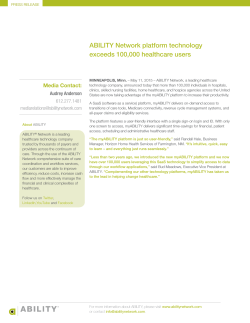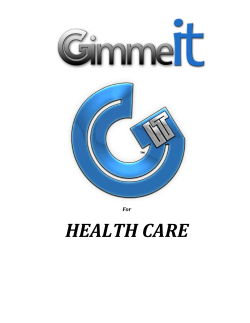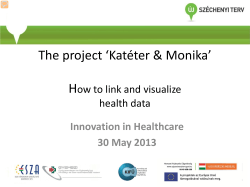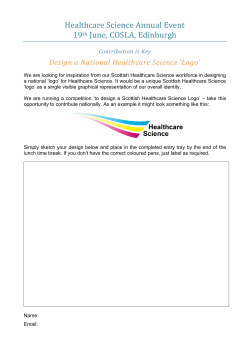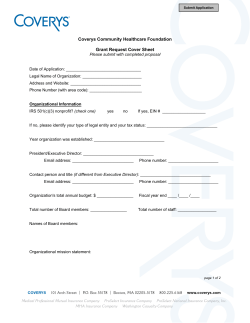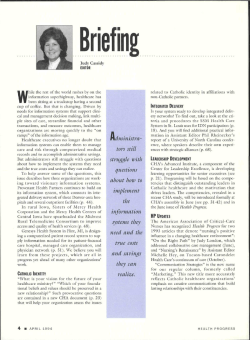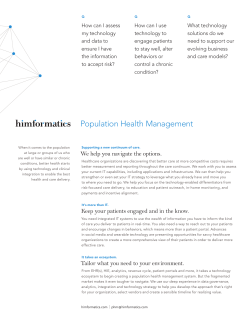
Difficult Conversations in Healthcare: Teaching and Practice
Difficult Conversations in Healthcare: Teaching and Practice 1-day course offered 3 times in 2015: Saturday, April 11, 2015 • Saturday, May 16, 2015 • Saturday, June 6, 2015 Waltham, MA USA • 9:30 am – 5:00 pm Dear Colleague: It is our pleasure to invite you to an upcoming course, Difficult Conversations in Healthcare: Teaching and Practice, held at Boston Children’s at Waltham / Conference Center in Waltham, MA, USA. Difficult Conversations in Healthcare: Teaching and Practice is a 1-day interprofessional faculty development course that offers the opportunity to learn about a variety of innovative philosophies, strategies and methods for teaching and enhancing relational capacities, communication skills, attention to values and ‘everyday ethics’, professionalism, and interprofessional collaboration and care. The course is designed for physicians in all specialties, residency and clerkship directors, medical/healthcare education leaders, clinicians/practitioners who work with patients of any age across the lifespan, multidisciplinary healthcare professionals (nurses, psychologists, social workers, and others), patient safety and quality staff, and others interested in and/or involved in teaching the course topics. Course participants will have the opportunity to learn about and experience an innovative relational learning model, known as the Program to Enhance Relational and Communication Skills (PERCS) developed by the Institute for Professionalism & Ethical Practice (IPEP) at Boston Children’s Hospital, Harvard Medical School, for teaching and enhancing communication skills and relational capacities. Participants will also learn about the International Charter for Human Values in Healthcare, that was created by an interprofessional global collaborative to enhance attention to values and skilled communication in healthcare. We will create a safe environment for relational learning, experience a variety of teaching methods, and integrate patient and family perspectives in innovative ways. Participants will experience and learn about a variety of educational strategies and pedagogy including: • • • • The PERCS model of realistic enactments with professional actors, collaborative learning, and reflection and feedback Use of narratives Videotape and discussion Interactive didactic presentation • • • • • • Interprofessional collaboration and teamwork Appreciative inquiry Values and everyday ethics Small group team-based learning Large group discussion Facilitated reflections We will pause at several junctures, ask participants to step back from the learning process, and reflect together on our experience as learners and as medical/healthcare educators and clinicians. We will discuss the central teaching principles, outline their ethical and conceptual rationale, and consider how participants might usefully integrate the pedagogy (i.e., the method and practice of teaching) into educational and practice endeavors in their home institutions. Difficult Conversations in Healthcare provides teaching and learning strategies for the communication skills, professionalism, and patient care competencies required by many regulatory organizations including the ACGME, LCME, Joint Commission, specialty and licensing boards, and for interprofessional competencies, and those of additional healthcare professions. Course Objectives: Upon completion of this course, participants will be able to: • Identify and discuss educational strategies and facilitation skills in order to teach and learn about communication skills, professionalism, ‘everyday ethics’, interprofessional collaboration, and relationship-centered healthcare. • Discuss the philosophy and components of relational learning as practiced in the Institute for Professionalism and Ethical Practice’s (IPEP) Program to Enhance Relational and Communication Skills (PERCS) • Develop and explore strategies to promote and implement relationship-centered teaching and learning within one’s home institution Course faculty include: Elizabeth Rider, MSW, MD (Course Director); David Browning, MSW, LICSW; Meg Comeau, MHA; Elaine Meyer, PhD, RN; Robert Truog, MD; Pamela Varrin, PhD; Erin Ward, MSEd, CAS CMEs: Physicians: Boston Children's Hospital is accredited by the Accreditation Council for Continuing Medical Education (ACCME) to provide continuing medical education for physicians. Boston Children's TM Hospital designates this live activity for the maximum of 6.75 AMA PRA Category 1 Credits . Physicians should claim only the credits commensurate with the extent of their participation in the activity. CEUs: Course provides 6.5 Social Work continuing education hours; 6.4 Nursing contact hours; and 6 Psychology continuing education credits. For more information about the course or to register online, please visit: http://www.ipepweb.org/workshops-consultation/course-registration-teaching-and-practice/ Questions? Please contact Allyson McCrary, Course Coordinator, by e-mail: Allyson.McCrary@childrens.harvard.edu or phone: 617-355-5021. We hope to see you in 2015! Please share this message with friends and colleagues who might like to learn more about this course. Sincerely, Elizabeth A. Rider, MSW, MD, Course Director Director of Academic Programs, Institute for Professionalism and Ethical Practice, Director, Faculty Education Fellowship in Medical Humanism and Professionalism, Boston Children’s Hospital / Harvard Medical School Chair, Medicine Academy, and Carlton Horbelt Senior Fellow, National Academies of Practice Senior Author, A Practical Guide to Teaching and Assessing the ACGME Core Competencies Founding Member, International Research Centre for Communication in Healthcare “It was absolutely fantastic, actors were excellent.” – Past Participant “This was wonderful and such a unique learning experience!”– Past Participant
© Copyright 2025
